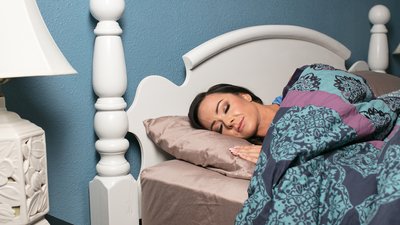Everyone knows losing weight entails eating healthy food, avoiding junk food, and drinking water, but what if there were a factor even more important, something that could actually improve the results you get from both exercise and nutrition?
There is something. Sleep.
Believe it or not, sleep is the most important thing you can do if you're trying to lose weight, stay in shape, or reach the level of fitness you desire. Getting the right amount of good-quality sleep can make or break even the most dedicated efforts to achieve better health and wellness.
How Much Sleep Do You Need?
As humans, we consider ourselves advanced and highly evolved. But when it comes to our physiology, we're still in the Stone Age. Our bodies are used to sleeping when it gets dark and waking up when it's light. That's a window of seven to ten hours. And everyone should be getting at least seven hours of sleep each night.[1]
Why Is Sleep So Important for Weight Loss?
Every bodily function depends on sleep. From regulating blood pressure to fighting off sugar cravings, good sleep is essential to weight loss. Why is sleep so critical? Your body is designed to perceive a lack of sleep as stress, and, unfortunately, it can't tell the difference between stress from working long hours or stress from, say, being chased by a lion.
Stress is all the same to your body, which responds by releasing chemicals—specifically, adrenaline and cortisol—into your bloodstream. The way your body sees it, stress is a sign to get ready to fight for survival, so it signals hormones to help you pack in more food for energy to fight. In other words, you get hungry.
Those same hormones also signal your body to hold onto as much stored fat as possible. So, you're hungrier, you're eating more, and you're storing weight. All because you have a big deadline coming up.
When you're having a marathon day at work, and you're working into the wee hours of the morning up against a deadline, your body is screaming for sleep. You, of course, keep working and tell your body, "Sorry, no time for sleep now. We've got work to do."

Your body responds in the only way it knows how—demanding the easiest, most accessible source of energy it can find: sugar. The reason your body craves empty calories and quick energy is because of the demands you're putting on it. Your body thinks, "No time for sleep? Fine, give me a doughnut, and I'll give you energy to get that report done!"
Sleep: The Stress Killer
Stress hormones cause hunger and weight gain. What's one of the best ways to combat stress? Sleep! When you sleep, your body finally has a chance to reset itself and recover. Your hormone levels regulate, and all is right with the world.
When you are under stress, your body is not out to get you. If anything, it's protecting you. When you're pounding energy drinks or cookies simply to stay awake, your body thinks you're fighting to survive. It responds by storing all that sugar as fat, thinking lean times are coming and it has to stock up.
Given plenty of quality sleep, your body knows you're safe and not in danger of starving to death in the near future—so it no longer needs to keep that stored fat. The stress response stops, and your body feels comfortable burning fat for energy instead of keeping it for an emergency.
Bottom line, when you don't sleep, you don't lose weight. I've seen it in literally hundreds of clients. You can do everything else right, but without enough sleep, your body won't release the fat you've stored simply because it's trying to keep you alive!
It's Not Just About Weight Loss
Sleep is critical to your health on every level, from helping you achieve peak athletic performance, to supporting your immune system so you don't get sick. While you're sleeping, your body is busy repairing itself on a cellular level. Ever wonder why you look awful in the mirror after staying up too late or getting up too early? It's because your body was deprived of the rest it needed to perform the cellular maintenance required to keep you looking your best.
In a recent study, a group of lab rats were implanted with tumors.[2] Half were allowed to sleep uninterrupted through the night; the other half were awakened every two hours. In three weeks, the tumors on the test group rats (the ones that woke up every two hours) had grown so much that the rats could no longer walk.
As for the control group who got enough rest, their condition remained unchanged. This is only one of dozens of studies conducted on the effects of sleep deprivation in the last 100 years, and what we've learned from these studies boils down to this: Consistent, adequate sleep supports health and well-being, while poor or inadequate sleep does not.
Your skin, your hair, your nails, your attention span—all of these can be improved by more or better-quality sleep. Who doesn't want to think more clearly? Who doesn't want to look their best? Good sleep can even help get rid of cellulite, folks. I can attest to that myself! A good night's sleep can improve every aspect of daily function, which is why sleep is my number-one rule of weight loss.
Frequently Asked Questions
What if I work odd hours?
When it comes to sleep, you have no choice; you need it. Whether it's a mid-shift nap, using light-blocking curtains or a face mask if you sleep during the day, or going to bed at the right time so you can wake up for that early-morning shift, your health comes first.
What if I have trouble staying asleep?
Try using sleep aids. There are a lot of sleep-enhancing products out there, and you'll want to check with your doctor first, especially if you are already taking other medications. Plenty of people, myself included, sleep better with either a prescription or over-the-counter sleep aid.
If sleep aids don't help, consider participating in a sleep study. You may have an underlying medical condition such as sleep apnea. A professional sleep clinic can figure out exactly what's impairing your sleep and offer you some solutions.

How can I get better quality sleep?
Improving the quality and duration of your sleep usually comes down to developing good habits. We live in a world where we have light 24/7, wreaking havoc on our internal circadian rhythms.
Develop a sleep-promoting bedtime routine:
- Go to bed about the same time every night.
- Turn off the TV and all electronics an hour before bed.
- Turn down the lighting in your home as you get closer to bedtime. Gradual darkening cues your body that it's time to sleep.
- Keep your phone in another room or set it to Do Not Disturb. Don't risk being awakened by the next text or notification. It can wait until morning.
- Invest in a quality mattress.
- Do whatever helps you relax before bed, like taking a hot bath, doing some restful yoga poses, reading, or meditating.
Remember, sleep should be your first priority when you're trying to lose weight. No amount of exercise or good nutrition can replace good-quality sleep. So guard your sleep, because only a rested body can lose the weight it needs to and be the best it can be.
References
- Hirshkowitz, M., Whiton, K., Albert, S. M., Alessi, C., Bruni, O., DonCarlos, L., ... & Neubauer, D. N. (2015). National Sleep Foundation’s sleep time duration recommendations: methodology and results summary. Sleep Health, 1(1), 40-43.
- Bergmann, B. M., Rechtschaffen, A. L. L. A. N., Gilliland, M. A., & Quintans, J. O. S. E. (1996). Effect of extended sleep deprivation on tumor growth in rats. American Journal of Physiology-Regulatory, Integrative and Comparative Physiology, 271(5), R1460-R1464.

